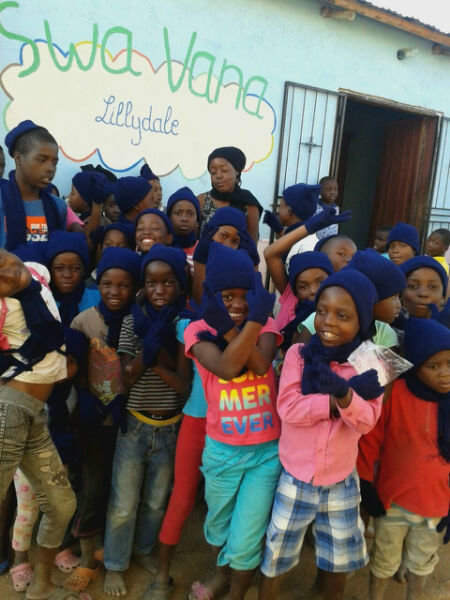By Ian Laxton | Starfish Partner
Swa Vana Children’s Project is a community-based organization meeting the needs of five hundred orphaned and vulnerable children in the Huntington region of Limpopo province, close to the Paul Kruger Gate of the Kruger Park. The region is large, under-resourced in terms of infrastructure and the people live in simple dwellings alongside dusty sand roads. Hidden beneath the rustic, peaceful atmosphere of the place one finds evidence of real poverty and desperation, particularly when one enters a home where there are no adults. These child-headed households are the legacy of the HIV/AIDS epidemic that swept through the region for twenty years.
AIDS systematically destroyed thousands of families, taking away one or both parents and leaving the children to fend for themselves.
Pontso Natoi is Swa Vana’s project leader. “Our aim is to provide for the basic needs of the orphaned and vulnerable children of our region. Our care-workers deal with them in their homes, providing emotional and spiritual support, counselling and practical help with their everyday lives. At our drop-in centres, we give the children a meal after school, assistance with homework, computer literacy lessons and general life-skills training,” she explains.
In addition, the organization helps to get the official identity documents required for them to secure child grants from the government. Given the red tape involved in getting the children ID’s, this is often a long and frustrating process, but the Swa Vana workers stick to it.
Given the size of the area, Swa Vana has established two satellite centres that cater for children living far away from Huntington. “We have to go to where the children are. They cannot come to us. One of our strengths is the location and sophistication of these satellite drop-in centres,” says Pontso.
These are at Lilydale and Justicia. At the Justicia centre, Swa Vana has partnered with a local church, which provides the basic infrastructure and facilities. Penny and Margaret are the regional co-ordinators and they are supported by three cooks and two after-school care-workers. A gardener on site looks after a substantial vegetable garden and the centre also boasts four laptops for computer instruction.
125 children are fed a meal here every day, an enormous task that keeps the cooks busy and the kitchen humming.
Lilydale is another few kilometres deeper into the area. Like Justicia, it is a fully-independent care centre with its own staff and kitchen facilities and provides the same meals, homework assistance and computer training as Huntington and Justicia.
Pontso is pleased that the organization has such a broad reach. “After small beginnings in 2004, we are now far bigger, thanks to our wonderful donors, including the Starfish Foundation. I would not be satisfied with just one centre in such a large area. The children need us everywhere, so we have to go to them. Very often, the meal we provide is the only proper food they will get all day. For our kitchen workers, it’s tough, but it’s a labour of love and they do it gladly.”
The drive back to Huntington takes fifteen minutes on the dusty roads, but suddenly this is not a problem. Why? Because this is a distance that the needy children of Justicia and Lilydale do not have to walk to get their essential support from Swa Vana.
Project reports on GlobalGiving are posted directly to globalgiving.org by Project Leaders as they are completed, generally every 3-4 months. To protect the integrity of these documents, GlobalGiving does not alter them; therefore you may find some language or formatting issues.
If you donate to this project or have donated to this project, you can receive an email when this project posts a report. You can also subscribe for reports without donating.
Support this important cause by creating a personalized fundraising page.
Start a Fundraiser